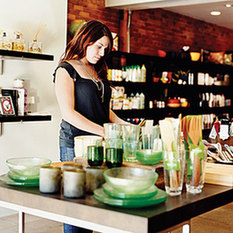Green tips for everyday
Water
• Fix any leaky faucets, toilets or water pipes. Even a small drip can add up to a lot of water over time.
• Wash your car the natural way - wait until it rains.
• Install water saving faucets.
Energy

• Conserve fuel by turning down the heat at night and while you are away from your home - or install a programmable thermostat.
• Use compact fluorescent light bulbs.
• Insulate your home against heat loss and periodically check insulation.
• Fix air leaks with weather stripping and caulking.
• In the winter, change your furnace air filters once a month. The heater uses more energy when it is full of dust.
• Insulate your electric hot water heater and pipes. Do not, however, insulate gas heaters and only start insulating gas heater pipes about six inches away from the heater.
• Avoid using cars - walk, cycle or use public transportation whenever possible.
• Avoid anything battery operated (or use rechargables or solar rechargables if batteries are unavoidable).
• Buy locally - not only is it good for the local economy, it will save energy because products haven't traveled across the globe to get to you.
Toxics
• Use non-toxic cleaning alternatives in your home, such as the ones listed in the booklet.
• Furnish your home with furniture made out of natural fibres, wood, metal and glass.
• Avoid the use of polyvinyl chloride (also known as PVC or vinyl) in your home. The entire life cycle of products made from PVC pollutes the environment and your home. PVC items include shower curtains, flooring, even some children's toys.
• Avoid the use of aerosols.
• Use castor or mineral oils to lubricate switches and hinges instead of lubricants containing solvents.
• Choose water based latex paints over solvent based paints when painting your home. Never use lead based paints.
• If you have a furnace, fireplace or gas heater, have them serviced regularly to prevent deadly fumes and install a carbon monoxide detector.
• Ensure you have good ventilation and balanced humidity in your home to prevent the growth of mould and mildew, which can be harmful to your health.
Waste
• Do not throw out your toxic household wastes, such as paint, paint thinner, and car fluids, in the garbage or down the drain. Check with your local facilities for proper disposal and avoid these products in the future.
• Take your own bags to the grocery store. If you take plastic bags, use them until they are worn out.
• Compost your food waste and use as nutrient rich soil for your lawn.
• Avoid excess packaging.
• Always use reusables mugs, lunch containers, batteries, pens, razors, etc.
• Replace paper products with reusable ones (use recycled, non-chlorine bleached paper when you do have to use paper).
(中国日报网英语点津 编辑)